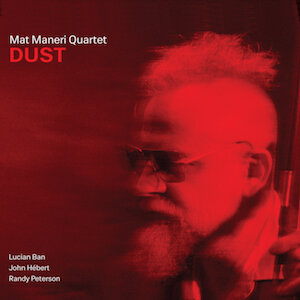Label: ESP-Disk, 2019
Personnel - John Surman: baritone and soprano saxophones; Alan Skidmore: tenor saxophone; Peter Lemer: piano; Tony Reeves: bass; Jon Hiseman: drums.
British pianist Peter Lemer reconvenes his old quintet and draws a potent portrait of his music, which thrives with an energy that can easily keep listeners engaged. The idea consisted in restoring the ensemble led by Lemer in 1966 to celebrate the 50th anniversary of the album Local Colour, released on the ESP Disk imprint (the year of the release was 1968). Just like in the old times, the pianist has teamed up with bassist Tony Reeves and drummer Jon Hiseman in the rhythm section, while the frontline is shared by experienced reed players like John Surman, who alternates between the baritone and the soprano saxophones, and Alan Skidmore, here replacing the unavailable Nisar Ahmad Khan on tenor. Sadly, Hiseman is not among us anymore given that he passed away four months after this live session has been recorded at London’s Pizza Express.
The diversity won’t make you bored, and the opener, “Ciudad Enahenado”, certifies what I’m saying. A rubato introduction, filled with fleet-fingered piano liveliness, Eberhard Weber-inspired bass slides, and motivic saxophone sketches, precedes a combative rhythmic cadenza that trots off with energy, inviting the horn players to blow spontaneously. After a couple of crescendos that threaten to become heavily swinging, the music shapes into an irreverent yet affectionate final section where elated folk melodies gain extra volume through the deep resonance of the baritone and the tenorist's dark tones.
Also carrying folk influences, “Flowville” features the two singing saxophones in straight cooperation. At some point, during Surman’s solo, the bassist opens a communication channel by answering him in the same idiom, and later on, Hiseman wisely suggests snare drum marching portions before embarking on a beautifully articulated solo with rich tom sounds.
Carla Bley’s “Ictus” is a classic avant-garde delight, here permeated with busy, heated statements. Only with bass and drums as a support, Surman, whose lyrical effervescence on soprano is never less than exciting, catches the final classical-derived phrase of Skidmore’s discourse. Afterward, their phrases merge and entwine before Lemer steps in, adding blues-inspired ideas, fast whirling movements, and sequences of knotty altered chords.
Contrasting with the mix of tranquility and ambiguity of “Carmen”, whose disjointed sense of instrumentation made me think of Sam Rivers, there's a sizzling rendition of John Coltrane’s famous “Impressions”. In turn, “Big Dick”, a post-bop ride that pays tribute to Lemer’s fellow saxophonist Dick Heckstall-Smith, is revelatory of the pianist’s coherent expressiveness along with Surman’s mercurial force and motivic elasticity. If Skidmore plays slightly more restrained on this one, he compensates with his melodic bite and swagger on the concluding “In The Out”, where the epic theme is followed by a joyous 4/4 rhythmic tapestry that swings back and forth in an unorthodox way.
This live session might not sound revolutionary anymore, but its adventurous moments are nonetheless inviting.
Grade B
Favorite Tracks:
01 - Ciudad Enahenado ► 02 - Ictus ► 08 - In The Out








































